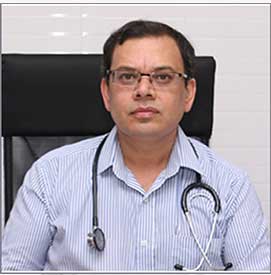Meditrina Hospital-Best Multispeciality Hospital in Nagpur | Best Critical Care

Vascular disease is a group of diseases of the blood vessels (arteries and veins of the circulatory system) where there is a disorder and disruption in the blood flow that can lead to disability and even death. Best vascular surgery hospital in Nagpur Vascular surgery is a surgical subspecialty which involves usage of minimal-invasive catheter procedures to treat the diseases of the vascular system, arteries, veins and lymphatic circulation. However, intracranial and coronary arteries are not included in vascular surgery.
WHY IS VASCULAR SURGERY PERFORMED? –
The vascular system is the network of veins that move throughout the body. Vascular surgery is performed to treat the following conditions:
Carotid Artery Disease-
Carotid arteries are the arteries that carry the blood to the head and neck. When plaque builds up inside the carotid arteries, it may cause a stroke. To prevent stroke, vascular surgery is performed to treat the affected carotid artery.
Aneurysms
It is the dilation of blood vessel(s) which can lead to a rupture and ultimately result in death. Aneurysms can occur in any part of the body, but they are most common in brain, legs, spleen and aorta. It occurs when the wall of an artery weakens, causing an abnormally large bulge.
Critical Limb Ischemia
This condition occurs when there a severe blockage in the arteries, leading to a reduction in the blood flow. If this condition is not treated timely, the surgeon might have to amputate the limb.
Chronic Venous Insufficiency
When the leg veins do not allow blood to travel back to the heart, the person is said to be suffering from a chronic venous insufficiency. A problem with the valves in the veins can cause the blood to flow in both the directions – to and from the heart. Varicose surgery is a must to treat the condition.
Lymphoedema
Lymphoedema is the swelling caused by the accumulation of fluid in the body’s tissue caused by blockage of lymphatic vessels.
Peripheral Vascular Disease (PVD)
PVD is a progressive yet slow circulation disorder caused by blockage, narrowing or spasms in a blood vessel. Vascular surgery is a bypass graft in which the blocked artery is replaced by a blood vessel from another part of the body or a synthetic tube. The new blood vessel or synthetic tube is used to reroute the blood flow.
Pulmonary Embolism
Pulmonary Embolism or PE is a blood clot that develops in a blood vessel of a leg. The clot then travels to the lung artery where it can suddenly block the flow. An embolus is the blood clot that forms in one area, breaks off and then travels to a different area of the body.
Renal Vascular Disease
This disease affects the blood flow in and out of the kidneys which may cause high blood pressure, kidney damage and kidney failure.
WHAT TO EXPECT BEFORE AND AFTER A VASCULAR SURGERY? || BEFORE SURGERY – DIAGNOSIS AND PREPARATION
A vascular surgeon clinically evaluates a patient basis their medical history and a physical examination. The surgeon also evaluates non-operative measures such as drug therapy and risk factor management. To diagnose if vascular surgery procedures are required, the surgeon may conduct the following tests to determine arterial blood flow –
- Arteriogram
- Ankle-Brachial Index (ABI) Test
- Ultrasound Scan
- Segmental Pressure Test
- Angiography
- Magnetic Resonance Imaging (MRI)
- Lymphangiography
- Lymphoscintigraphy
- Computed Tomography Scan
- Duplex Ultrasound Scanning
- Plethysmography
However, there may not be any symptoms of vascular disease caused by blood clots until the clot grows significantly larger to block the blood flow.
Before the surgery, the patient is screened, and a thorough evaluation is done. Patients possessing a high risk must take oral beta-blockers a couple of weeks before the surgery to reduce the possibility of a heart attack.
AFTER A VASCULAR SURGERY-
Aftercare after any surgery is important. However, the duration of care will depend on the type of surgery, criticality and other factors. In some cases, the patient will have to be hospitalised for more than 24 hours till the situation normalises.
WHAT YOU NEED TO BE AWARE OF VASCULAR SURGERY?
All surgeries are known to carry some risks including vascular surgery. A risk of infection is possible wherever an incision is required. There is a higher risk of complications during a vascular surgery where major blood vessels or organs are concerned. Furthermore, patients who smoke, have chronic lung or kidney disease, high blood pressure and other illnesses are at a greater risk of developing complications during vascular surgery. Failed or blocked grafts, bleeding, heart attack or stroke, and leg swelling are some of the risks associated with vascular surgery.
TEAM THAT CARES

Dr. Vivek Lanje
MBBS, DNB, M.Ch (cardio vascular & Thoracic Surgery)
Consultant Cardiothoracic & Vascular Surgery

Dr Pankaj Banode
MBBS, DMRD, DNB RADIOLOGY
Interventional Radiologist

